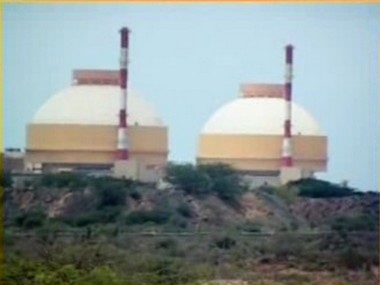New Delhi: Right to information (RTI) activists have vehemently opposed proposals under the Nuclear Safety Regulatory Authority (NSRA) Bill that seek to keep nuclear bodies outside the ambit of the RTI act. The activists have said that the number of cases where government bodies have actually rejected RTI applications on the grounds that such disclosure would jeopardize India’s nuclear interests is significantly low. Therefore, they say there is no need to stop the flow of information regarding nuclear regulatory bodies. “There is an overwhelming public interest involved here. Instead of talking about stonewalling information, government should pro- actively disclose such information as it is crucial for the citizens,” said Krishna Raj Rao, an RTI activist based in Mumbai. [caption id=“attachment_218844” align=“alignleft” width=“380” caption=“Activists say that the bill is overreaching: Reuters”]
 [/caption] The NSRA Bill, which was introduced to Parliament in September 2011, proposes a list of amendments to various existing laws including the exemption clause of the RTI act. The proposals in this regard are to ensure that a) sensitive information on matters relating to nuclear safety is not disclosed to citizens and b) confidentiality of commercially sensitive information of technology holders is not compromised. The NSRA Bill also authorises the central government to create organizations to regulate nuclear materials and activities in national defence and security interests. Clause 26 of the act says that information regarding these organizations should also be exempted from disclosure under the RTI act. Clause 40 makes a person disclosing such information liable for punishment - with a maximum of five years in prison and an unspecified fine. According to data available with the Commonwealth Human Rights Initiative (CHRI), a civil society group working for the transparency act, the Atomic Energy Regulatory Board received 43 RTI applications during 2010- 2011. It provided information in all these cases. The Department of Atomic Energy received 280 RTI applications during the same period. Of these, 33 applications were rejected. BARC Kalpakkam and Tarapur rejected three and 13 RTI applications respectively. However, in none of the cases, was the application was rejected because of scientific, strategic, defence or commercial interests. Data regarding the Department of Atomic Energy and its 32 related institutions shows that there have been only two occasions (in 2010- 2011) when information was denied on grounds of defence, scientific or strategic interests which closely relate to the public interests that cover nuclear and radiation safety matters. “This clearly indicates that people are not seeking sensitive information that may jeopardise nuclear safety issues. Hence, the proposal made by the NSRA Bill seeking to amend the RTI act, are unwarranted,’ said Venkatesh Nayak, co- convenor, national campaign for people’s right to information (NCPRI). The NSRA Bill aims at constituting a Council of Nuclear Safety headed by the Prime Minister, with six union ministers, the Chairman of the Atomic Energy Commission, and the Cabinet Secretary as its members. The Bill also seeks to establish a Nuclear Safety Regulatory Authority (NSRA), to replace the currently existing Atomic Energy Regulatory Board. After its tabling in the parliament, the Bill was referred to the standing committee on science and technology, environment and forests soon after tabling. The committee’s report in this regard will be presented during the budget session of Parliament.
[/caption] The NSRA Bill, which was introduced to Parliament in September 2011, proposes a list of amendments to various existing laws including the exemption clause of the RTI act. The proposals in this regard are to ensure that a) sensitive information on matters relating to nuclear safety is not disclosed to citizens and b) confidentiality of commercially sensitive information of technology holders is not compromised. The NSRA Bill also authorises the central government to create organizations to regulate nuclear materials and activities in national defence and security interests. Clause 26 of the act says that information regarding these organizations should also be exempted from disclosure under the RTI act. Clause 40 makes a person disclosing such information liable for punishment - with a maximum of five years in prison and an unspecified fine. According to data available with the Commonwealth Human Rights Initiative (CHRI), a civil society group working for the transparency act, the Atomic Energy Regulatory Board received 43 RTI applications during 2010- 2011. It provided information in all these cases. The Department of Atomic Energy received 280 RTI applications during the same period. Of these, 33 applications were rejected. BARC Kalpakkam and Tarapur rejected three and 13 RTI applications respectively. However, in none of the cases, was the application was rejected because of scientific, strategic, defence or commercial interests. Data regarding the Department of Atomic Energy and its 32 related institutions shows that there have been only two occasions (in 2010- 2011) when information was denied on grounds of defence, scientific or strategic interests which closely relate to the public interests that cover nuclear and radiation safety matters. “This clearly indicates that people are not seeking sensitive information that may jeopardise nuclear safety issues. Hence, the proposal made by the NSRA Bill seeking to amend the RTI act, are unwarranted,’ said Venkatesh Nayak, co- convenor, national campaign for people’s right to information (NCPRI). The NSRA Bill aims at constituting a Council of Nuclear Safety headed by the Prime Minister, with six union ministers, the Chairman of the Atomic Energy Commission, and the Cabinet Secretary as its members. The Bill also seeks to establish a Nuclear Safety Regulatory Authority (NSRA), to replace the currently existing Atomic Energy Regulatory Board. After its tabling in the parliament, the Bill was referred to the standing committee on science and technology, environment and forests soon after tabling. The committee’s report in this regard will be presented during the budget session of Parliament.
No need to keep nuclear bodies outside ambit of RTI: Activists
Danish
• February 20, 2012, 15:00:48 IST
RTI activists say that to date, not a single RTI application on nuclear bodies has been rejected because of scientific, strategic, defence or commercial interests.
Advertisement
)
End of Article